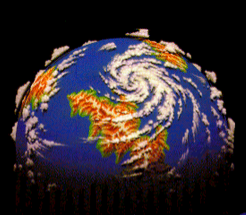"The North Atlantic just completely destroyed its June average temperature record, breaking the previous record by more than 0.4 °C (0.7 °F).
A stunningly sharp excess for such a large body of water."
Something I’d heard about climate change many years ago was that it would happen almost imperceptibly slowly at first, then suddenly when we reach the tipping point, it would start happening very rapidly. I think we’re right at the sharp edge of that tipping point and things are going to get very interesting very quickly.
“Interesting” - the understatement of the century
It’s related to the old-timey curse that sounds like a complement. “May you live in interesting times”, because as interesting as it may be to read in the history books, It wasn’t as fun for the people living in those times.
Indeed. One can only wish to live in exceedingly boring times…
It’s just that you can’t be bothered to write up history with all the orgies and drugs.
god I wish we didn’t live in such interesting times
And now the change had the inertia. There’s no stopping it now.
The slow change and then tipping point is probably less to do with building up inertia and more in line with how a buffered system works.
Define interesting?
Previously inhospitable land could become more accessible
And the inverse, which seems important.
I can’t help but think of the climate activists who defaced the Van Gogh painting. Except they didn’t – because the painting is actually behind protective glass. I sincerely doubt most people got that fact from the outrage news cycle that followed that incident.
So who came out to be the villains of the story? The oil and gas industry, where Exxon had relatively accurate warming models decades ago and still funded climate change denialism? No, of course not. Because every major media’s headline was about how expensive this painting is and didn’t immediately explain the lack of actual damage, nor did they actually cover the climate travesty we are living through. The villains were the climate protestors, who are objectively correct and chose a non-destructive way to get attention that was immediately spun against them.
An example from fiction is in the film Armageddon. Yes, it’s a dumb movie, but it was a hit nevertheless. At the start of the movie some Greenpeace protestors are on a ship protesting the offshore oil rig, which shows Bruce Willis’s character cavalierly assaulting them with golf balls as he points out that they’re hypocrites for being on an ocean-faring vessel which requires… drum roll OIL! To operate!! Wow, such an epic own! This kind of argumentation is used to this day. “You want to raise taxes? Why don’t YOU pay more taxes on your own. You want to curb carbon emissions? Why don’t YOU stop driving a car.” Fuck off. Such a “Yet you participate in society” moment.
So what are people supposed to do? Roll over an accept it? Do we all just wait and see until civilization collapses? Because I cannot see functioning societies as we know them existing in 150-200 years. Maybe even 100 years. Personally, I don’t think anything will change until some heads of some certain people actually start rolling. The COVID response taught me that even with full, modern medical knowledge the response from the people in charge will be too little, too late, if anything at all. Just a big fucking collective shrug. Like the emoji. “🤷♂️ we cannot close businesses for two months to nip this novel airborne virus in the bud. We cannot use emergency powers to produce masks and give them to people for free, we will instead just have random meaningless shortages as the price goes up during the critical early moments. We will suffer indefinitely, instead. We don’t have the money to do it right once now, only to do it wrong into perpetuity.”
The oil and gas industry and their funded allies hold the keys to the doors, they squat on every position of power, they have all the money, and they have a media engine designed to keep a full 30-40% of people on their side with flagrant misinformation or lack of coverage.
I’m not personally doomer about climate change. It doesn’t stop me from sleeping at night. But I am realistic about it. We’re fucked. Nothing’s changing. The Joe Biden promise: Nothing will fundamentally change under his watch. He’s keeping that one.
Edit: We are also flying more than ever before! Hooray! This certainly will help. https://nitter.1d4.us/flightradar24/status/1679865495112019968
The end is near, The end is near, the time has come. No escape found, As we witness the damage we’ve done.
Earth will be fine. Humanity will be fine. We will likely just move away from coastal areas.
Definitely a concern but humans are resilient and very adaptive.
Will not completely go extinct is not the same as fine. Even ignoring climate refugees and all that, let’s look at a simple thing: food supply.
The mathematics of global famine are quite simple. Add all the calories that earth produces in one day on average and divide it by 1500. That’s the amount of people that can exist.
Now, like 70% off all calories come from just 3 crops: rice, corn and wheat. As a good approximation, all of those lose about 10% harvest yield for each 1 degree C in temperature rise. It’s not really linear and is better at the beginning (so like 5% for the first degree), and much worse further on. But in general the approximation works.
Humanity now produces about 1.5x of the food supply we need, and even with super-optimized logistics we’re not going to get it lower than 1.2–1.3x population, since a lot of food gets wasted by cafes/restaurants and people themselves. Some just gets bad because it’s not consumed in time or takes too long to deliver or sell.
And with the current temperature rise estimations we’re looking at losing caloric supply for about 20% of the entire population in the next 20 or so years.
And that’s just one example. Have you seen rivers of dead fish in Australia and the states? For each species there is a point when the water gets too hot to hold enough oxygen or to cool down their bodies, and then bam — the whole species dies in a day. Right now, some algae, corals and plankton are like 1.5 degrees away from mass death.
It’s not really that “fine”.
Sorry for the rant.
An excellent write-up of what will unfold.
One note is that the food loss won’t just be linear. It will be chaotic within the probabilities you noted. Crop loss is effectively a weather event and, as such, a chaotic one. That means extreme events will be the driving force behind food shortages. Namely, heatwaves will cause extensive loss of crops in specific areas. Over some years, that will average down, but people don’t eat long-term averages; they eat daily. So we should expect significant one-time impacts. That is, the severity is not the average but rather the peak.
Humanity will be fine if we work together.
I have no reason to think we will.
Do not take me wrong I wish it’s true but I will not bet on it.
It’s also worth note that this is mostly caused by the ban on sulfur emissions a couple of years ago. The commission that banned sulfur emissions from ships basically decided that they were going to do a big geo engineering experiment and they were going to do it not in favor of humanity against global warming, but in favor of global warming against humanity.
And they decided to cut off emissions really quickly so that we get this massive incredible hilariously bad spike instead of slowly tapering off over time.
Honestly curious, but do you have more info on this?
It’s mostly bullshit. Certain types of emissions create particles that reflect sunlight away from the earth, thus masking some of the warming that we have created through green house gas emissions. Banning sulphur emissions isn’t the cause of the problem, greenhouse gasses are. Banning sulphur just made our observed warming closer to what our actual warming is.
You’ll find people making the same claims about transitioning to electric cars accelerating warming since cars produce similar particles. It’s just maintain the status quo bullshit passively enabling the continuation of oil and gas. The solution isn’t to keep burning certain types of fuel because it masks our warming. Obviously the solution is to stop producing as much greenhouse gas as we possibly can.
Banning sulphur emissions isn’t the cause of the problem, greenhouse gasses are. Banning sulphur just made our observed warming closer to what our actual warming is.
Banning sulfur increased global warming. End of story. It doesn’t matter if CO2 is the root cause. What matters is that now things are even warmer and we have even less time to avoid catastrophic consequences of the CO2.
You’ll find people making the same claims about transitioning to electric cars accelerating warming since cars produce similar particles.
This is not even remotely similar.
Cars are being phased out over a long period of time and over that time period the lack of CO2 from electric cars will more than make up for the sulfur.
Also cars do not emit anywhere near what those boats did, because the boats were burning what is basically the dirtiest possible fuel.
So with these boats you don’t just get a lack of albedo, you still get the carbon emissions. It’s literally the worst of both worlds.
You’re acting like it’s somehow a good thing that we are seeing this massive temperature spike in the north Atlantic.
And no “it will harm people and that will be good because then maybe they will X” isn’t even remotely excusable. You’re talking about potential environmental consequences and literal human death from a stupid ass regulatory decision that should have at the vert least spread the reduction in sulfur emissions over the course of a decade instead of delivering a damn gut punch to the environment of the region.
Here’s what will happen.
People will still be apathetic and generally support green energy.
We will still transition at the same rate because it’s mostly a question of technology and infrastructure. Nobody will give up their homes, cars, and televisions, even if the north Atlantic experiences an environmental collapse.
The environment will be worse off.
death by degrees, most people wont give a shit until it is too late
People give a shit, and we are moving towards a solution. You just have to see it through all the doomerism that’s so popular on the internet.
The problem is that you need to have pragmatism, and you need context. I remember in the United States when “energy independence!” Seemed like an impossible far off goal. We guzzled down oil like mad and everyone was scared of it. We had peak oil. It was a meme that everyone talked about but never seemed to get fixed.
Then, quite silently, the change happened. Between 2012 and 2015 our efforts in research and technological advancements created fracking and revolutionized American energy generation.
These programs get solved. It’s just hard to get things moving and it takes years for investments to pay off. More energy than ever is green. And literally fucking Texas is one of the biggest green energy centers.
Have hope. Keep advocating for good policy, but know that at the end of the day we will succeed.
Is anyone readying a list of climate criminals? Individuals. Not companies. What are we going to do with them? Real consequences.
Read the Ministry for the Future for inspiration.
Looks good. I am going to read that. Thanks.
deleted by creator
Legality isn’t an excuse. The evidence and advice has been there for decades. You don’t have to do much reading to see precedents where people have been tried and prosecuted for things that were legal at the time.
Retroactive crimes because we are all about to be short of fucks.
Sometime I think the Mayan calendar people were right. The world ended in 2012, it’s just a slower process than John Cusack movies would lead us to believe.
So it’s been over a decade obviously, but I believe that’s actually what they were marking in 2012 with the end of their calendar. Not the end of the world but the end of our current era
Its a cyclic calandar and the last major cycle ended. If there were still ancient Mayans maintaining the calendar they would have calculated another major cycle.
That’s it! Thank you for correcting me, if it had been a snake it would’ve bit me
“We destroyed the planet but for a beautiful we generated a lot of value for shareholders.”
I’d like to point out that there are other spikes in the temperature historically. So while the temperature is rising year over year, the large increase here may be an anomaly.
Let’s keep working on reducing our CO2 emissions…
But this spike is spikier than the last el Nino spike, so even if spikes do occur, this is the spikiest spike so far.
Without actually seeing the numbers and just looking at the graph, it seems like there are several historical instances of a similar year-over-year spike of similar magnitude - around 1860, 1990 and a few more (I am doing that from memory, dates not exact).
The quite comprehending of the ending of it all 🎶
deleted by creator
El Nino strikes again


















